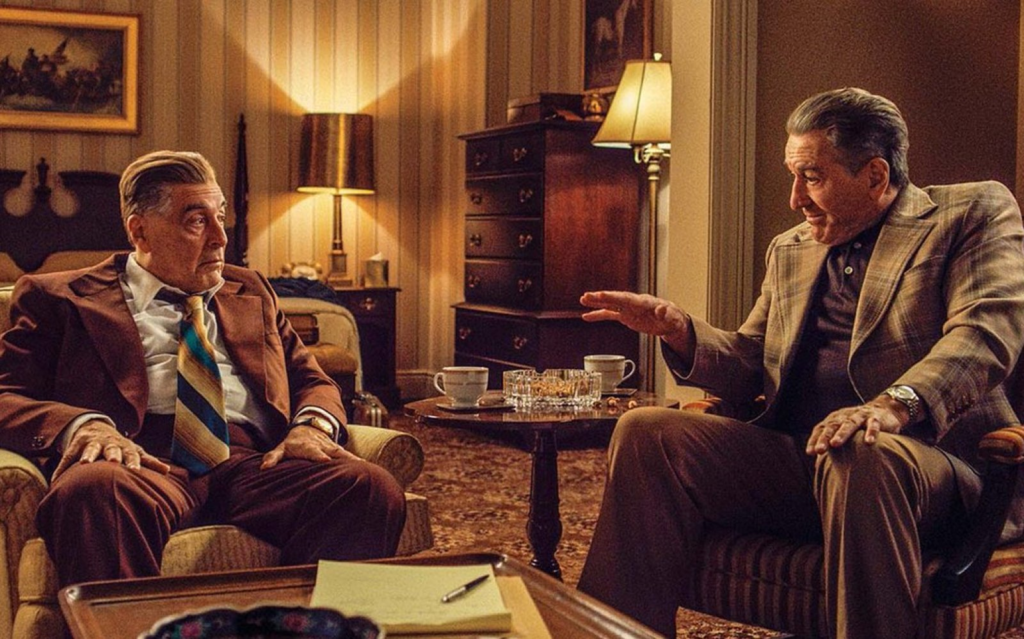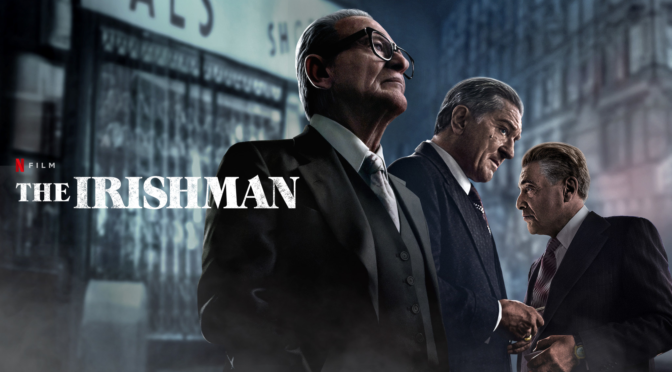The Irishman is Martin Scorsese’s longest film and a fitting maturation of the topics, themes, and genre he has developed over his vast and accomplished career. The film stars Robert De Niro (Heat) as Frank Sheeran, an Irishman who worked closely with the Italian mafia. He becomes a trusted confidant of Russell Bufalino (Joe Pesci; Goodfellas) and later union leader Jimmy Hoffa (Al Pacino; Heat).
Running three and a half hours, the film pulls out every trick available to keep the audience interested. It employs multiple framing narratives, from Sheeran in an assisted living facility, to Sheeran late in life, to the chronological events of his involvement in the mafia, to prevent the story from growing stale and, to Scorsese’s credit, it mostly works. There is a period later in the film, before a critical action must be completed, that it starts to drag as we wait for the inevitable, but overall the lengthy runtime seems appropriate given the decades of story covered. Digital de-aging is used on the main cast, now in their late-70s, to distinguish the numerous time periods and the technology is effective in making the actors appear different, but not to the necessary degree. De Niro appears younger in early sections, but he never appears young and while the aging process is noticeable, it is strange to see that Sheeran never seems much younger than 50.
The Irishman strikes a noticeably different tone than much of Scorsese’s other crime movies. While there is a rise and fall of criminals, the way their lifestyle is portrayed is unique. Unlike Goodfellas or The Wolf of Wall Street, Sheeran’s acceptance and growth within the mafia isn’t, even momentarily, glorified. He seems to be financially stable, but the film doesn’t have the exorbitant displays of wealth, like drug-filled parties on yachts, we would expect. Crucially, extra effort is taken to reinforce the short-lived nature of their successes and the long-term consequences of their crimes. As each new gangster is introduced, a title card lists their age and cause of death, almost always showing a brutal act and brief life expectancy. The tone falls closer to Silence, Scorsese’s story of migrant priests in feudal Japan, with the actions onscreen being fueled by duty rather than greed.

This change is most evident in De Niro’s performance. He may be the lead character but, unlike Henry Hill or Jordan Belfort, he is not the driving force of the plot. Early on he explains that after serving in the military, he learned to take orders and follow direction without much thought for their consequences or morality. He never seems enticed by crime as much as he is a dutiful cog in the gears of a criminal organization which allows for the supporting cast, Pesci and Pacino, to provide most of the dramatic moments.
The film offers Al Pacino many chances to deliver the kind of performance he has become notorious for. His Hoffa is an overconfident asshole that is always in the middle of a condescending rant against someone and Pacino appears to be relishing the opportunity to deliver numerous verbal beatdowns. His energy provides a welcome contrast to Sheeran’s reserved nature and effectively steals the majority of the film. The Irishman is less about Sheeran’s individual life and more him caught in the pull of Hoffa’s ambitions and the complications that arise due to their connection to mafia. With this unique, more austere tone, Scorsese has created a crime epic with a charismatic cast and a moral compass that grounds the violence onscreen in somber consequences.

4/5 stars.
